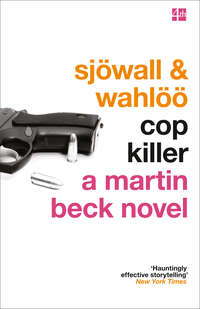
Полная версия
The Terrorists
‘Well, I don't like him much, but generally speaking I've no objections.’
Malm looked unhappy. ‘I think it would be extremely inappropriate to send him,’ he said. ‘He would disgrace the Swedish force. He behaves like a boor and uses language more suited to a docker than a former ship's officer.’
‘Perhaps not when he's speaking Spanish,’ said Martin Beck. ‘Anyway, even if he does express himself a little crudely sometimes, at least he chooses his moments.’
That was not strictly true. Martin Beck had recently heard Gunvald Larsson call Malm ‘that magnificent arsehole’ in the man's presence, but fortunately Malm had not realized that the epithet was intended for him.
The Commissioner did not seem to take much notice of Malm's objections. ‘It's perhaps not a bad idea,’ he said thoughtfully. ‘I don't think his tendency to uncivilized behaviour will be much of a problem in this case. He can behave well if he wants to. He has a better background than most. He comes from a wealthy and cultured family, he's had the best possible education and an upbringing that has taught him how to behave correctly in all possible circumstances. That shows, even if he does his best to conceal it.’
‘You can say that again,’ mumbled Malm.
Martin Beck sensed that Stig Malm would very much have liked the assignment and that he was annoyed at not even being asked. He also thought it would be good to be rid of Gunvald Larsson for a while, as he was not much liked by his colleagues and had an unusual capacity for causing rows and complications.
The Commissioner did not seem wholly unconvinced even by his own reasoning, and Martin Beck said encouragingly, ‘I think we should send Gunvald. He has all the qualifications needed for the job.’
‘I've noticed that he's careful of his appearance,’ said the Commissioner. ‘His way of dressing shows good taste and a feeling for quality. That undoubtedly makes an impression.’
‘Exactly,’ said Martin Beck. ‘It's an important detail.’ He was conscious of the fact that his own clothing could hardly be called tasteful. His trousers were creased and baggy, the collar of his polo shirt was wide and limp from many washings, his tweed jacket was worn and missing a button.
‘The Violent Crimes Squad is well-staffed and ought to be able to manage without Larsson for a few weeks,’ said the Commissioner. ‘Or does anyone have any other suggestion?’
They all shook their heads. Even Malm appeared to have perceived the advantage of having Gunvald Larsson at a safe distance for a while, and Eric Möller yawned again, apparently pleased that the meeting was drawing to a close.
The National Commissioner rose to his feet and closed the file. ‘Good,’ he said. ‘Then we are agreed. I shall personally inform Larsson of our decision.’
Gunvald Larsson received the information without much enthusiasm, nor was he especially flattered by the assignment. His self-esteem was pronounced and imperturbable, but he was not entirely unaware that some of his colleagues would heave a sigh of relief when he left, and regret only that he was not leaving for good. He was aware that his friends on the force could be easily counted. As far as he knew, there was only one. He also knew that he was regarded as insubordinate and troublesome, and that his job often hung by a thread.
This fact did not disturb him in the slightest. Any other policeman of his rank and salary grade would at least have felt some anxiety over the constant threat of being suspended or actually dismissed, but Gunvald Larsson had never spent a sleepless night over the prospect. Unmarried and childless, he had no dependants, and he had long since broken off all communication with his family, whose snobbish upper-class existence he despised. He did not worry much about his future. During his years as a policeman, he had often weighed the possibility of returning to his old profession. Now he was nearly fifty and he realized that he would probably never again go to sea.
As the day of his departure approached, Gunvald Larsson discovered that he was genuinely pleased about the assignment, which, while regarded as important, could hardly be expected to be especially difficult. It involved at least two weeks' change in his daily routine, and he began to look forward to the journey as if to a holiday.
On the evening before his departure, Gunvald Larsson was standing in his bedroom in Bollmora, clad in nothing but underpants, looking at his reflection in the long mirror on the inside of his wardrobe door. He was delighted with the pattern on the underpants, yellow moose against a blue background, and he owned five more pairs. Half a dozen of the same kind, though green with red moose, were already packed in the large pigskin case that lay open on his bed.
Gunvald Larsson was six feet tall, a powerful and muscular man with large hands and feet. He had just showered and routinely stepped on to the bathroom scales, which registered sixteen stone. During the last four years, or perhaps it was five, he had put on about a stone and a half, and he looked with displeasure at the roll of fat above the elastic of his underpants.
He pulled in his stomach and it occurred to him that he ought to visit the station gym more often. Or begin swimming when the pool was completed.
Except for the spare tyre, though, he was really quite pleased with his appearance.
He was forty-nine years old, but his hair was thick and abundant and his hairline had not crept back and made his forehead higher. It was low, with two marked lines across it. His hair was cut short and so fair that the grey in it didn't show. Now that it was wet and newly combed, it lay smooth and shiny across his broad skull, but when it had dried it would rise and look bristly and untidy. His eyebrows were bushy and of the same fair colour as his hair, and his nose was large and well formed, with wide nostrils. His pale china-blue eyes looked small in that rugged face and were a trifle too close together, which sometimes, when they were empty of expression, made him look deceptively stupid. When he was angry – and that was often – a furious crease appeared between his eyes, and his light-blue eyes could strike terror into the most hardened criminals, as well as into the hearts of subordinates.
The only person who had never been on the receiving end of Gunvald Larsson's fury was Einar Rönn, a colleague in the Stockholm Violent Crimes Squad and his only friend. Rönn was a placid and taciturn northerner with a perpetually running red nose, which dominated his face to such a degree that one hardly noticed the other details of his appearance. He carried about within him an inextinguishable longing for his home district around Arjeplog in Lapland.
As Gunvald Larsson and Rönn served in the same department, they saw each other nearly every day, but they also spent a good deal of their spare time together. When possible, they took their annual leave at the same time and went to Arjeplog, where they mostly devoted themselves to fishing. None of their colleagues was able to understand this friendship between two such different personalities, and many wondered how Rönn, with stoic calm and few words, could turn a raging Gunvald Larsson into a meek and mild lamb.
Now Gunvald Larsson inspected the row of suits in his well-filled closet. He was well acquainted with the climate of the country he was to visit, and he remembered several suffocatingly hot spring weeks in that port many years before. If he was to endure the heat he would have to be lightly clothed, and he had only two suits that were sufficiently cool. For safety's sake, he tried them on and discovered to his dismay that he couldn't get the first on and that the trousers of the second would only just fasten if he made an effort and inhaled deeply. They were also tight across the thighs. At least he could button the jacket without difficulty, but it was tight across the shoulders and either it would limit his freedom of movement or the seams would split.
He hung the useless suit back in the wardrobe and laid the other one across the lid of his case. It would have to do. He had had it made for him four years earlier, from thin Egyptian cotton, nougat-coloured with narrow white stripes.
He completed his packing with three pairs of khaki trousers, a shantung jacket and the suit that was too tight. In the pocket on the inside of the lid, he put one of his favourite novels. Then he closed the lid, fastened the brass buckles on the wide straps, locked the case and took it into the hall.
He cared about his own EMW too much to let it stand in the airport parking lot, so Einar Rönn was to pick him up in his car the next morning and drive him to Stockholm's Arlanda Airport. Like most Swedish airports, Arlanda was a dismal and misplaced establishment and succeeded excellently in giving expectant visitors an even more distorted view of Sweden than the country deserved.
Gunvald Larsson threw the blue-and-yellow moose underpants into the hamper in the bathroom, put on his pyjamas and went to bed. He did not suffer from travel fever and fell asleep almost immediately.
2
The security expert did not reach even to the middle of Gunvald Larsson's upper arm, but he was very neat and elegant in his light-blue suit with its flared and beautifully pressed trousers. With the suit, he wore a pink shirt, shiny torpedo-toed black shoes and a lilac tie. His hair was almost black, his skin light brown and his eyes olive-coloured. The only discordant note was the pistol holster bulging under his left armpit. The security expert's name was Francisco Bajamonde Cassavetes y Larrinaga; he came from an extremely distinguished family.
Francisco Bajamonde Cassavetes y Larrinaga spread the security plan out on the balustrade, but Gunvald Larsson was looking instead at his own suit; it had taken the police tailor seven days to make it, and the result was excellent, as this was a country where the level of the art of tailoring was still high. Their only difference of opinion had been over the space for a shoulder holster, which the tailor had taken for granted. But Gunvald Larsson never used a shoulder holster. He carried his pistol in a clip in his belt. Here abroad, of course, he was not armed, but he would be using the suit in Stockholm. There had been a brief dispute and naturally he had had his way. What else? With deep satisfaction he glanced down at his well-tailored legs, sighed contentedly and looked around at his surroundings.
They were standing on the eighth floor of the hotel, a spot chosen with great care. The motorcade would pass below the balcony and stop at the provincial palace a block away. Gunvald Larsson glanced politely at the plan, but without much enthusiasm, as by now he knew it all by heart. He knew that the harbour had been closed to all traffic that morning and the civilian airport had been closed since the presidential plane had landed.
Straight ahead lay the harbour and the azure-blue sea. Several large passenger liners and cargo boats were anchored at its outer edges. The only ships moving were a warship, a frigate and a few police boats in the inner harbour. Below them lay the paseo, edged with palms and acacias. Across the street was a rank of taxis, and beyond that a row of colourful horse-drawn cabs. All these had been thoroughly checked.
Every person in the area, apart from the military and civilian police forming an arm's-length barrier along each side of the paseo, had passed through metal detectors of the kind with which most larger airports were now equipped.
The civilian police wore green uniforms, while the military police wore blue-grey. The civilian police wore boots, the military police high-top shoes.
Gunvald Larsson suppressed a sigh. He had done a dummy run along this stretch at the rehearsal that morning. Everything had been in its place except the President himself.
The motorcade was made up as follows. First, a motorcycle party of fifteen specially trained security police. After that, an equal number of motorcycle police from the regular force, followed by two cars loaded with security men. Then came the presidential car, a black Cadillac with bulletproof blue glass. (During the dummy run, Gunvald Larsson had sat in the back seat as a stand-in, unquestionably an honour.) Next came an open car full of security men, on the American model. And finally, more motorcycle police, followed by the radio reporters' bus and cars full of other authorized journalists. In addition, civilian security men were spread along the road from the airport.
All the street lamps were decorated with pictures of the President. The route was fairly long, indeed very long, and Gunvald Larsson had had time to become quite bored with that bull-necked head, puffy face and black enamel steel-framed glasses.
That was the ground protection. The airspace was dominated by army helicopters at three levels, with three choppers in each group. In addition, a division of Starfighters was sweeping back and forth, guarding the upper airspace.
The entire operation was organized with such perfection that unpleasant surprises ought to be fairly unthinkable.
The heat at this time of the afternoon was, to put it mildly, oppressive. Gunvald Larsson was sweating, but not excessively. He could not imagine that anything could go wrong. Preparations had been singularly detailed and thorough, and planning had been going on for several months. A special group had been assigned to look for faults in the planning, and a number of corrections had been made. Add to this the fact that every attempted assassination in this country – and there had been quite a few – had failed. The National Commissioner had probably been right when he said that they were the world's greatest experts in their field.
At a quarter to three in the afternoon, Francisco Bajamonde Cassavetes y Larrinaga glanced at his watch and said, ‘Twenty-one minutes to go, I presume.’
There had been no need for a Spanish-speaking delegate. The security man spoke the Queen's English as used in the most sophisticated clubs of Belgravia.
Gunvald Larsson looked at his own chronograph and nodded. At that moment, to be more precise, it was exactly thirteen minutes and thirty-five seconds to three on Wednesday the fifth of June, nineteen hundred and seventy-four.
Outside the harbour entrance, the frigate was turning to sound the welcoming salute, which was its only real assignment. High above the paseo the eight fighter planes drew white zigzag lines in the bright blue sky.
Gunvald Larsson looked around. Down the paseo was a huge brick bullring with curved arcades plastered in red and white. In the other direction they were just turning on the multicoloured sprays of a tall fountain; there had been a severe drought all year and the fountains – this was not the only one – were only set going on especially grand occasions.
Now they could hear the drone of helicopters and the sirens on the motorcycles. Gunvald Larsson checked the time. The motorcade seemed to be ahead of schedule. Then his china-blue gaze swept the harbour and noted that all the police boats were now in action. The harbour installations themselves were much the same as when he had been at sea, only the ships were completely different. Supertankers, container ships, huge ferries on which cars were more important than passengers – they were all unfamiliar to him from his own years at sea.
Gunvald Larsson was not alone in his observation that the order of events was ahead of the prescribed schedule. Cassavetes y Larrinaga spoke swiftly but calmly into his radio, smiled at his fair-haired guest and looked out over the sparkling fountains, where the first motorbike formation of specially trained security police was already appearing between the lines of green-uniformed police officers.
Gunvald Larsson shifted his gaze. Immediately below them a cigar-smoking security man was strolling along the middle of the street keeping an eye on the police marksmen posted on the surrounding roofs. Behind the line of policemen was the row of taxicabs with blue lines along their sides, and in front of them an open yellow-and-black horse-drawn carriage. The man on the box was also dressed in yellow and black, and the horse had yellow-and-black plumes in the band round its forehead.
Behind all this were the palms and acacias and a few lines of curious people. A handful of them carried the only sign approved by the authorities, a picture of that bull-necked head, puffy face and black enamel steel-framed glasses. The President was not a particularly popular visitor.
The motorcade was moving very quickly. The first of the Security Service cars was already below the balcony. The security expert smiled at Gunvald Larsson, nodded assuringly and began to fold up his papers.
At that moment, the ground opened, almost directly beneath the bulletproof Cadillac.
The pressure waves flung both men backwards, but if Gunvald Larsson was nothing else, he was strong. He grabbed the balustrade with both hands and looked upward.
The roadway had opened like a volcano from which smoking pillars of fire were rising to a height of a hundred and fifty feet. Atop the flaming pillars were diverse objects. The most prominent were the rear section of the bulletproof Cadillac, an overturned black cab with a blue line along its side, half a horse with black-and-yellow plumes in the band round its forehead, a leg in a black boot and green uniform material, and an arm with a long cigar between the fingers.
Gunvald Larsson ducked as a mass of flammable and nonflammable objects began to rain down on him. He was just thinking about his new suit when something struck him in the chest with great force and hurled him backwards on to the marble tiles of the balcony.
The roar of the explosion finally faded away, and there were sounds of cries, desperate calls for help, someone weeping and another person screaming hysterical curses, before all human sounds were drowned by the sirens of ambulances and the wail of a fire engine.
Gunvald Larsson got to his feet, found himself not seriously hurt and looked about to see what it was that had knocked him down. The object lay at his feet. It had a bull neck and a puffy face, and strangely enough, the black enamel steel-framed glasses were still on.
The security expert scrambled to his feet, clearly unhurt, even if some of his elegance had been dissipated. He stared incredulously at the head and crossed himself.
Gunvald Larsson looked down at his suit. It was ruined. ‘Goddammit,’ he said.
Then he looked at the head lying at his feet. ‘Maybe I ought to take it home,’ he said to himself. ‘As a souvenir.’
Francisco Bajamonde Cassavetes y Larrinaga looked questioningly at his guest. ‘Catastrophe,’ he said.
‘Yes, you could say that,’ said Gunvald Larsson.
Francisco Bajamonde Cassavetes y Larrinaga looked so unhappy that Gunvald Larsson felt duty-bound to add, ‘But no one could really blame you. And anyhow, he had an unusually ugly head.’
3
The same day that Gunvald Larsson had his strange experience on the balcony with the lovely view, an eighteen-year-old girl named Rebecka Lind was being tried in Stockholm city court on a charge of armed robbery of a bank.
The public prosecutor in her case was Bulldozer Olsson, who for some years had been the judiciary's expert in armed robberies, which were spreading across the land like a plague. He was, as a result, an extremely harried man with so little time to spend at home that it had taken him three weeks, for instance, to discover that his wife had left him for good and been replaced by a laconic message on his pillow. This had not made all that much difference, as with his usual swiftness of action he had found himself another within three days. His new life partner was one of his secretaries who admired him unreservedly and devotedly, and certainly his suits appeared to be slightly less rumpled from that day on.
On this day he arrived breathlessly, two minutes before the trial was to begin. He was a corpulent but light-footed little man with a joyous countenance and lively movements. He always wore bright pink shirts, and his ties were in such indescribably bad taste that they had driven Gunvald Larsson almost insane when he had worked in Bulldozer's special group.
He looked round the bare and ill-heated anteroom of the court and discovered a group of five people, among them his own witnesses, and a person whose presence surprised him enormously. It was, in fact, the chief of the Murder Squad.
‘What on earth are you doing here?’ he said to Martin Beck.
‘I've been called as a witness.’
‘By whom?’
‘The defence.’
‘The defence? What does that mean?’
‘Braxén, counsel for the defence,’ said Martin Beck. ‘He drew this case, apparently.’
‘Crasher,’ said Bulldozer, clearly upset. ‘I've already had three meetings and two arrests today, and now I'll have to sit and listen to Crasher for the rest of the afternoon, I suppose. Do you know anything about this case?’
‘Not much, but Braxén's argument convinced me I ought to come. And I don't have anything special on at the moment.’
‘You people in the Murder Squad don't know what real work is,’ said Bulldozer Olsson. ‘I've got thirty-nine cases on the books and just as many on ice. You should work with me for a while, then you'd find out.’
Bulldozer Olsson won all his cases, with very few exceptions indeed. This, to put it delicately, was not especially flattering to the judiciary.
‘But you'll have an amusing afternoon,’ said Olsson. ‘Crasher'll give you a good show, for sure.’
Their discussion was interrupted by the case being called, and those involved, with one important exception, filed into the courtroom, a singularly dismal sector of the principal city courthouse. The windows were large and majestic, which in no way excused but possibly explained why they clearly had not been cleaned for a very long time.
The judge, assistant judge and seven jurymen on a platform behind a long connecting pulpit were staring with dignity out into the courtroom.
The accused was brought in through a small side door, a girl with shoulder-length fair hair, a sulky mouth and distant brown eyes. She was wearing a long, pale-green embroidered dress of some light, thin material and had black clogs on her feet.
The court was seated.
The judge turned to the girl, who was sitting to the left of the bench, and said, ‘The accused in the case is Rebecka Lind. Are you Rebecka Lind?’
‘Yes.’
‘May I ask you to speak a little louder?’
‘Yes.’
‘You were born on the third of January, nineteen hundred and fifty-six?’
‘Yes.’
‘I must ask the accused to speak louder.’ He said this as if it had to be said ritualistically, which was true, as the acoustics in the courtroom were singularly poor.
‘Counsel for the defence Hedobald Braxén appears to have been delayed,’ he went on. ‘In the meantime, we can summon the witnesses. Counsel for the prosecution has called two witnesses – Kerstin Franzén, bank cashier, and Kenneth Kvastmo, police constable. The defence has called the following: Martin Beck, chief inspector, Murder Squad; Karl Kristiansson, police constable; Rumford Bondesson, bank director; and Hedy-Marie Wirén, home economics teacher. Counsel for the defence has also called Walter Petrus, business executive, to testify, but he has declared himself unable to attend and has also declared that he has nothing whatsoever to do with the case.’
One of the jurymen sniggered.
‘The witnesses may now leave the court.’
The two policemen – as always on these occasions wearing uniform trousers and black shoes plus dreary blazers – Martin Beck, the bank director, the home economics teacher and the bank cashier all trooped out into the foyer. Only the accused, her guard and one spectator remained in the courtroom.
Bulldozer studied his papers busily for about two minutes, then looked curiously at the spectator, a woman Bulldozer reckoned to be about thirty-five. She was sitting on one of the benches with a shorthand pad open in front of her. She was of below average height and had dead-straight blonde hair, not especially long. Her clothes consisted of faded jeans, a shirt of indefinite colour and strap sandals. She had broad, sunburnt feet with straight toes, flat breasts with large nipples that could be seen quite clearly through her shirt. The most remarkable thing about her was her small, angular face with its strong nose and piercing blue gaze, which she directed in turn on those present. Her gaze rested especially long on the accused and Bulldozer Olsson; in the latter case so piercingly that the public prosecutor rose to pour himself a glass of water and moved into a position behind her. She at once turned and caught his eye.








